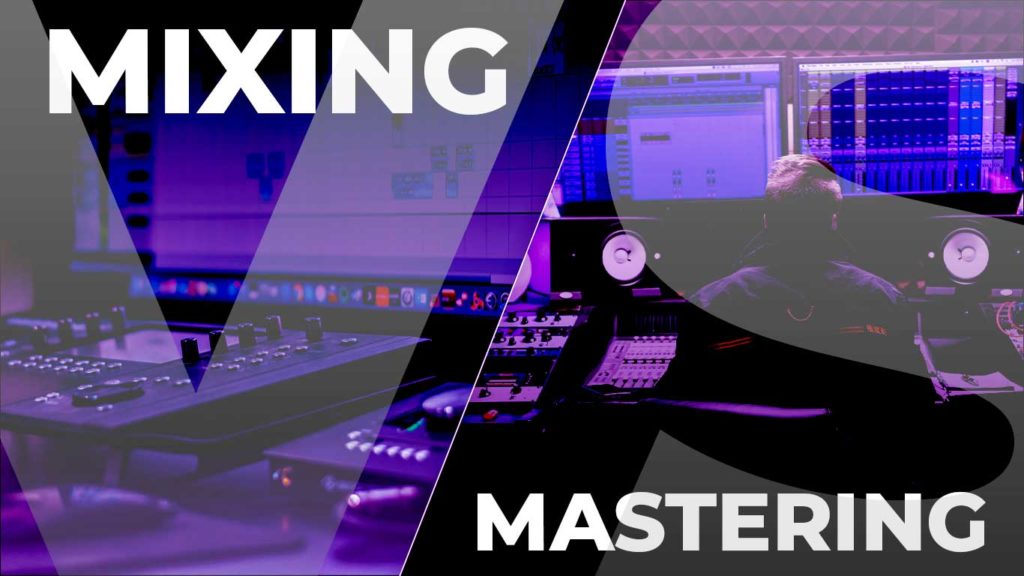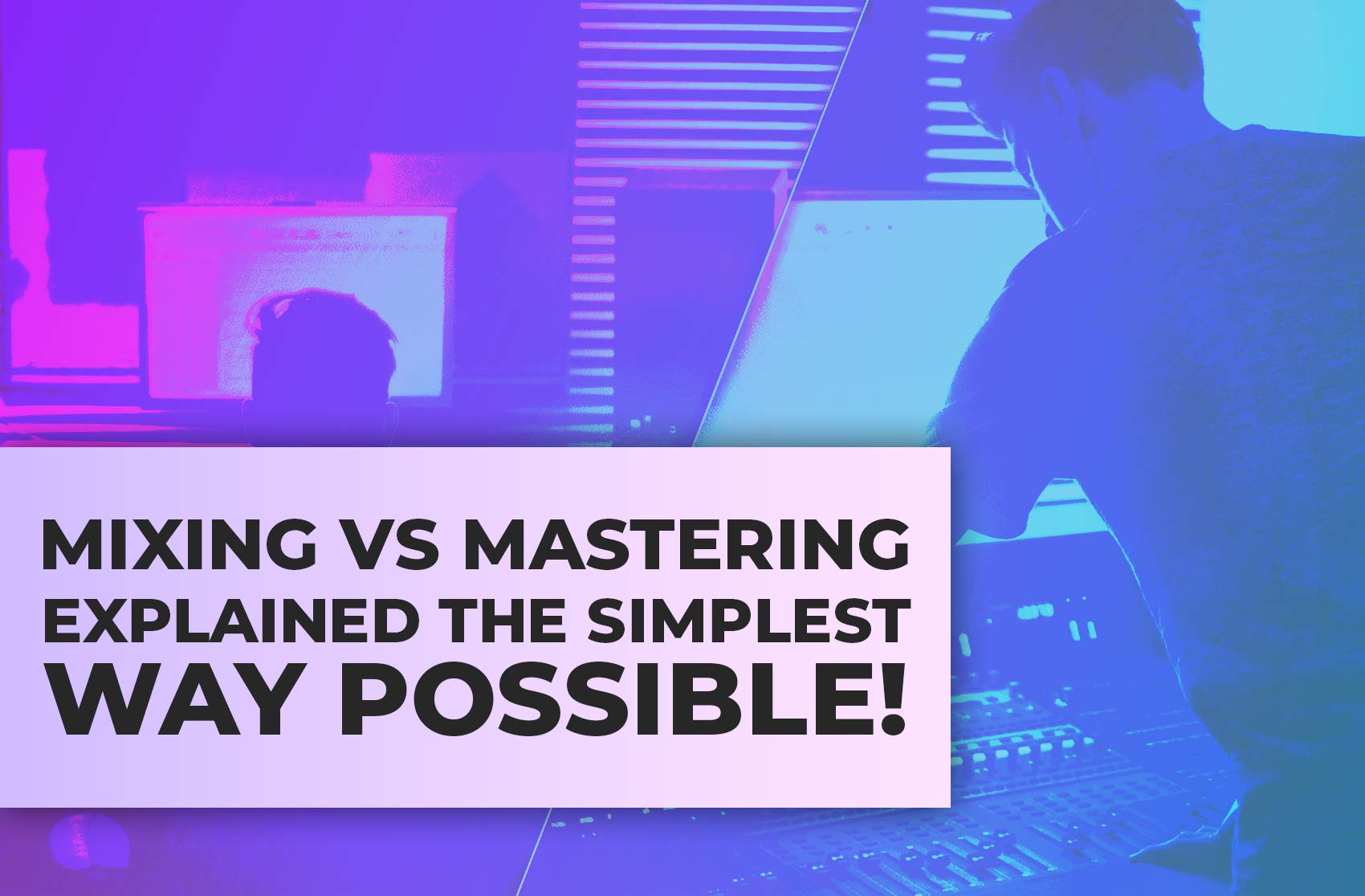So, you’ve started producing music or working in the field, and you keep hearing those two words: “mixing” and “mastering”, and you wonder – what does each of them mean exactly? Well, In this article I’ll do my best to give an answer which is as simple and as accurate as possible.
To put it plainly, mixing is the process of combining all the different elements in your song and making them sound well together. Mastering is the process of optimizing the final, complete mix as a new unit or entity, and making sure it’s balanced, sounds well, and has the right loudness.
More specifically, “Mastering” is a form of audio post-production, and it’s the final process of preparing and transferring recorded audio from a source containing the final mix and converting it over to store and playback the audio.
This completed audio is known as “the master” because it is the source from which all copies will be produced.
Mastering requires critical listening, but software exists to help with, or kind of take over the process. Results can vary a lot, depending upon the individual engineer, the skills of the engineer, the accuracy of the speaker monitors, and the listening environment.
Mastering engineers have their own ideas and beliefs, some will add personality to the audio, and some will leave things clear and transparent.
Mastering studios are some of the most expensive rooms out there with the rarer and sought-after gear made. Though beyond legendary limiters and EQs, it might be communication skills that are most important in the entire mastering process.
History Lesson
Mastering has been a part of music production history since the beginning. When you wanted to press a vinyl record, but you recorded the song on tapes, what do you do? You need a mastering engineer to bridge the sound from one medium to another.
This required a lot of knowledge on the technical aspects of how to transfer sound from tape, but the physical limitations of the vinyl as well. What weight of vinyl do you need?
What speed do the machines need to play the tapes? Good mastering can make a good song into a radio hit. Bad mastering can make a good song totally unlistenable. Of course, a bad song can’t be saved by the best mastering in the world.
This conversion of audio formats happened from vinyl to cassette tapes, from cassettes to CDs, CDs to MP3s, and beyond. Today you could argue that mastering isn’t about moving audio from one format to another. Today, mastering is more about how the listener plays the audio.
It’s now more important than ever to master your album or track by listening on the most common headphones or earbuds on the market because that’s how most people will hear it. Car speakers, Bluetooth speakers, “Beats by Dre” or “AirPods” would make sense. Some demographics of listeners play music straight out of an iPhone speaker.
Today, it’s more common than ever to have higher-end speakers and subwoofers in the average home or vehicle. This constantly changes the way that mastering engineers make changes or adjustments on tracks.
Difference between Mixing and Mastering

Let’s use an analogy of the house-construction industry to better understand the audio post-production industry. In this example, let’s say the musicians are the construction workers, maybe a drummer is like a concrete worker, a guitarist is a carpenter, a bassist is a plumber, and the piano is the electrician. The mixing engineer would be the one to help find the right tiles or carpets, maybe the color of paint on the walls.
A mastering engineer, on the other hand, is much more like the quality control and safety inspector of the house. They will know if the house will stand on its own, or fall over. They will spot the rough edges that need to be sanded down or the flooring that isn’t level. The mastering process can be like a safety test for your audio in many ways.
It’s not enough that the house is built, but that someone would actually want to live in the house. To expect everyone to know about each other’s job is just unrealistic, just like a plumber doesn’t need to know about paint, a mixer doesn’t need to know about every aspect of mastering. It’s perfectly fine to be one or the other, or both a mixer and masterer.
Though it’s possible to do it all by yourself, it’s not very practical for most of us. If you have an interest in mastering, don’t be scared, it just takes some experience and getting your hands dirty. Check out this article on how to balance mixing and mastering yourself.
To put it another way, mixers might be the cooks in the back of the restaurant but masterers are the ones choosing the plate, garnishing, and plating the dish.
Nothing is more essential to develop your mixing skills than practice. As a mixer, you need stems and audio files, so we recommend downloading some professionally recorded free multitracks to get started.
So how does a Masterer master?
The equipment used to master is typically the most delicate or precise equipment you can find in the industry. The best audio-to-digital converters, compressors, and EQs are the tools the mastering engineer uses in their arsenal.
The settings on these tools can be totally foreign to most mix engineers because the nature of each job is so different. A mixing EQ will serve a very different purpose from a mastering EQ.
In mastering, you might end up listening to the audio on 4 or 5 different sets of speakers in order to check frequencies. As a Mixer, it might be more important to do your mixing on just one set of monitors, at one volume the whole time, in order to get consistency.
The tools a mastering engineer uses are for preparing the sounds for ear consumption. The tools a mixing engineer use, are for blending multiple bits of audio into one audio. Both engineers are trying to make the audio sound better, but one is running blending and the other is running quality control.
If a mastering engineer finds an issue, this doesn’t mean that the mixer did a bad job! The mastering engineer is there for picking up “red flags” in the mix that the mixer and artist aren’t able to pick up on.
They have more precision tools and their ears are “looking” for very different things that the mixer isn’t even looking for. So this is the equivalent of mixers using a magnifying glass, but mastering needs a microscope. Sometimes mastering can fix a mix, and sometimes it can’t.
A great mix is pretty important to get a good master, so you might regret not reading some quick tips on mixing too!
Why do I need Mastering?
Mastering is important when your song is competing with other similar songs. Having a reference track is an important part of getting the audio mastered the way you want. There are many styles of mastering, and no one right answer, (though technically, you can master something “wrong”) bring your mastering engineer some examples of what you like, and they will try to apply that to your audio.
Yet another reason is to remove bias from the project. Artists can be biased about their own work, can’t they?
Mixers are also biased when it comes to analyzing their own work, nevermind the issue of ear fatigue. Some of us are better at recognizing our own work and our own flaws than others, but there is usually a value to itself, in letting another professional set of ears put some work in.
To understand mastering, one needs to stop thinking about mixing, and start thinking about the playback of the song, and how it goes from ones and zeros to your ears. Mixing is to get the instruments sounding just right, compared to others.
This is not what mastering is about, in mastering, the whole mix needs to be treated as a new unit or entity. The creative decisions have been made in the mixing process.
Mastering is much more technical, and the technicals that go into mastering are extremely specialized, and are not the artist’s problem and not really the mixer’s problem either. This is a job for the Mastering engineer.
Human Mastering vs Computer/Artificial Intelligence Mastering
Lastly, should I have a human master my audio or should I pay a computer to do it? The short answer is why not have the best of both worlds. There are pros and cons to each so I recommend trying both.
It’s not uncommon at all to give your audio to 2 or 3 Mastering engineers. Then you blind test them all to hear what sounds best, instead of *who* you think sounds best, also taking the price out of the equation.
For those who don’t know yet, there is an “auto” mastering suite called LANDR. It’s a great option and worth using, but humans bring in qualities that no computer can. Of course, the computer can trim frequencies, but a human can take your direction.
If you want a “bright” quality to one song, but a “dark” quality on the next track, a human masterer will be able to use your feedback in ways a computer can’t. The computer doesn’t have experience or ears or “taste”, but sometimes that can be a good thing.
I recommend using both and seeing what you like best. I know many artists that run a track through LANDR before they take the project to a Masterer so they have a reference.
I hope this gave you some clarity on the complex world of mastering, whether you are an artist that needs to find a mastering engineer or you are a mixer looking to send your work to a mastering engineer. For more tips on how to master yourself, check out this link here!







